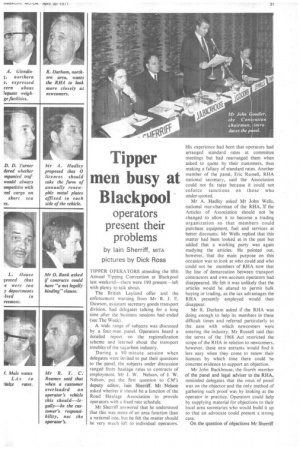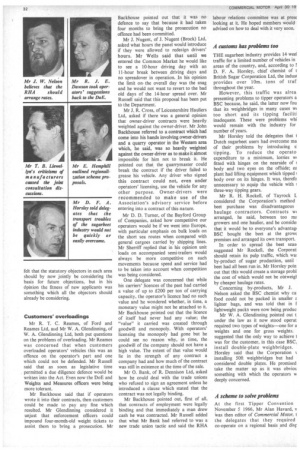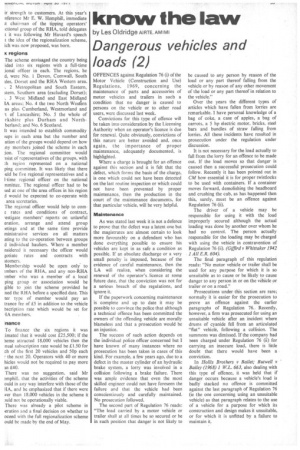Tipper men busy at
Page 33

Page 34

Page 35

If you've noticed an error in this article please click here to report it so we can fix it.
Blackpool
operators present their problems
by lain Sherriff, MITA pictures by Dick Ross
TIPPER OPERATORS attending the fifth Annual Tipping Convention at Blackpool East weekend—there were 190 present—left with plenty to talk about.
The British Leyland oiler and the enforcement warning from Mr R. J. E. Dawson, assistant secretary goods transport division, had delegates talking for a long time after the business sessions had ended (see The Week).
A wide range of subjects was discussed by a four-man panel. Operators heard a detailed report on the regionalization scheme and learned about the transport troubles of the sugarbeet industry.
During a 90-minute session when delegates were invited to put their questions to the panel, the subjects under discussion ranged from haulage rates to contracts of employment. Mr J. W. Nelson, of J. W. Nelson, put the first_ question to CM's deputy editor, Jain Sherriff. Mr Nelson asked whether it should be a function of the Road Haulage Association to provide operators with a fixed rate schedule.
Mr Sherriff answered that he understood that this was more of an area function than a national one, but he felt the matter should be very much left to individual operators. His experience had been that operators had arranged standard rates at committee meetings but had rearranged them when asked to quote by their customers, thus making a fallacy of standard rates. Another member of the panel, Eric Russell, RHA national secretary, said the Association could not fix rates because it could not enforce sanctions on those who under-quoted.
Mr A. Hadley asked Mr John Wells, national vice-chairman of the RHA. if the Articles of Association should not be changed to allow it to become a trading organization so that members could purchase equipment. fuel and services at better discounts. Mr Wells replied that this matter had been looked at in the past but added that a working party was again studying the articles. He pointed out, however, that the .main purpose on this occasion was to look at who could and who could not be members of RHA now that the line of demarcation between transport contractors and own-account operators had disappeared. He felt it was unlikely that the articles would be altered to permit bulk buying or trading, as the tax advantages the RHA presently employed would then disappear.
Mr R. Durham asked if the RHA was doing enough to help its members in these difficult times and referred particularly to the ease with which newcomers were entering the industry. Mr Russell said that the terms of the 1968 Act restricted the scope of the RHA in relation to newcomers, however, these new entrants would find it less easy when they come to renew their licences by which time there could he concrete evidence to support an objection.
Mr John Backhouse, the fourth member of the panel and legal adviser to the RHA, reminded delegates that the onus of proof was on the objector and the only method of gathering such proof was by looking at the operator in practice. Operators could help by supplying material for objections to their local area secretaries who would build it up so that an advocate could present a strong case.
On the question of objections Mr Sherrill' felt that the statutory objectors in each area should by now jointly be considering the basis for future objections, but in his Opinion the fitness of new applicants was something which all the objectors should already be considering.
Customers' overloadings Mr R. T. C. Reames, of Ford and Reames Ltd, and Mr W. A. Glendinning, of W. A. Glendinning Ltd, both put questions on the problems of overloading. Mr Reames was concerned that when customers overloaded operators' vehicles this was an offence on the operator's part and one which could not be defended. Mr Russell said that as soon as legislative time permitted a due diligence defence would be written into the Act Even now the DoE and Weights and Measures officers were being more tolerant.
Mr Backhouse said that if operators wrote it into their contracts, then customers could be made to pay any fine which resulted. Mr Glendinning considered it unjust that enforcement officers could impound four-month-old weight tickets to assist them to bring a prosecution. Mr Backhouse pointed out that it was no defence to say that because it had taken four months to bring the prosecution no offence had been committed.
Mr J. Nugent, of J. Nugent (Brock) Ltd, asked what hours the panel would introduce if they were allowed to redesign drivers' hours. Mr Wells said that until we entered the Common Market he would like to see a 10-hour driving day with an 11-hour break between driving days and no spreadover in operation. In his opinion the limit on the overall day was the snag and he would not want to revert to the bad old days of the 14-hour spread over. Mr Russell said that this proposal has been put tO the Department.
Mr J. R. Cross, of Leicestershire Hauliers Ltd, asked if there was a general opinion that owner-driver contracts were heavily weighted against the owner-driver. Mr John Backhouse referred to a contract which had come into his hands involving owner-drivers and a quarry operator in the Western area which, he said, was so heavily weighted against the owner-driver as to make it almost impossible for him not to break it. He pointed out that the quarrymaster could break the contract if the driver failed to grease his vehicle. Any driver who signed this contract could not, even under operators' licensing, use the vehicle for any other purpose. Owner-drivers were recommended to make use of the Association's advisory service before entering into a contract of this nature.
Mr D. D. Turner, of the Bayford Group of Companies, asked how competitive our operators would be if we went into Europe, with particular emphasis on bulk loads on the short sea routes when compared with general cargoes carried by shipping lines. Mr Sherriff replied that in his opinion unit loads on accompanied semi-trailers would always be more competitive on such movements because speed and service had to be taken into account when competition was being considered. One delegate was concerned that while his carriers' licences of the past had carried a value of up to £.200 per ton of carrying capacity, the operator's licence had no such value and he wondered whether, in time, a monetary value might not be attached to it. Mr Backhouse pointed out that the licence of itself had never had any value; the "value" it carried was created through goodwill and monopoly. With operators' licensing the monopoly had gone but he could see no reason why, in time, the goodwill of the company should not have a high value. The extent of that value would lie in the strength of any contract a company had and how much of the contract was still in existence at the time of the sale.
Mr 0. Bank, of R. Dennison Ltd, asked how he could deal with the trade unions who refused to sign an agreement unless he introduced a clause which stated that the contract was not legally binding.
Mr Backhouse pointed out, first of all, that contracts of employment were legally binding and that immediately a man drew cash he was contracted. Mr Russell added that what Mr Bank had referred to was a new trade union tactic and said the RHA labour relations committee was at prese looking at it. He hoped members would advised on how to deal with it very soon.
A customs has problems too
THE sugarbeet industry provides 14 weel traffic for a limited number of vehicles in areas of the country, and, according to 1 D. F. A. Horsley, chief chemist of British Sugar Corporation Ltd, the indus1 provides over 10m. tons of traf throughout the year.
However, this traffic was alrea presenting problems to tipper operators a BSC because, he said, the latter now fou that its weighbridges in many cases im too short and its tipping faciliti inadequate. These were problems whi would remain with the industry for number of years.
Mr Horsley told the delegates that 1 Dutch sugarbeet users had overcome ma of their problems by introducing si tipping. To reduce the operato expenditure to a minimum, lorries wi fitted with hinges on the nearside of 1 body and two eyes on the offside; ea plant had lifting equipment which tipped1 body over on its hinges. It was, therefo unnecessary to equip the vehicle with 1 three-way tipping gears.
Mr R. H. Rockell, of Tayrock L considered the Corporation's method beet purchase was disadvantageous haulage contractors. Contracts wc arranged, he said, between too ma growers and one haulier, and he considei that it would be to everyone's advantagi BSC bought the beet at the grow( premises and arranged its own transport.
In order to spread the beet seas' suggested Mr Rockell, the Corporati should retain its pulp traffic, which wa! by-product of sugar production, until beet had all been run in. Mr Horsley poin out that this would create a storage probl the cost of which would not be obtweigl by cheaper haulage rates.
Concerning by-products, Mr J. Nelson asked the BSC chemist why ca food could not be packed in smaller lighter bags, and was told that in f lightweight packs were now being produc
Mr W. A. Glendinning pointed out t under the law as it now stood operat required two types of weights—one for a weights and one for gross weights. suggested that the only way to achieve t was for the customer, in this case BSC, install double-plate weighbridges. Horsley said that the Corporation N installing 50ft weighbridges but had considered double plates. He promised take the matter up as it was obviou something with which the operators w deeply concerned.
A scheme to solve problems
At the first Tipper Convention November 5 1966, Mr Alan Havard, v Was then editor of Commercial Motor, t the delegates that they required co-operate on a regional basis and disc ir strength to customers. At this year's nference Mr E. W. Hemphill, immediate chairman of the tipping operators' ictional group of the RHA, told delegates t it was following Mr Havard's speech .t the idea of the regionalization scheme, ich was now proposed, was born.
x regions
The scheme envisaged the country being ided into six regions with a full-time ,ional officer in each. The regions, he d, were No. 1 Devon, Cornwall, South ales. Dorset and the RHA Western area.
2 Metropolitan and South Eastern, stern, Southern area (excluding Dorset); 3 West Midland and East Midland IA areas; No. 4 the two North Western as plus Cumberland, Westmorland and of Lancashire; No. 5 the whole of Ashire plus Durham and Northberland; and No. 6 Scotland.
It was intended to establish commodity nips in each area but the number and ation of the groups would depend on how my members joined the scheme in each ;ion. The regional committee would isist of representatives of the groups, with th region represented on a national ping committee. It was likely that there luld be five regional representatives and a l-time regional officer on the national rnmittee. The regional officer had to be sed at one of the area offices in his region d would be expected to co-operate with . area secretaries.
The regional officer would help to corn e rates and conditions of contract, restigate members' reports on unlawful eration, arrange and attend group :etings and at the same time provide ministrative services on all matters ating to the co-operation between groups d individual hauliers. Where a member nsidered it necessary the officer would gotiate rates and contracts with stomers.
Membership would be open only to inhers of the RHA, and any non-RHA !mber who was a member of a local ping group or association would be gible to join the scheme provided he ned the RHA before a specified date. This ter type of member would pay an trance fee of £5 in addition to the vehicle bscription rate which would be set for -IA members.
inance
To finance the six regions it was imated that it would cost £25,500; if the heme attracted 18,000 vehicles then the nual subscription rate would be £1.50 for eh of the first 20 vehicles and 50p each r the next 20, Operators with 40 or more hides would not be required to.pay more an /40.
There was no suggestion, said Mr that the activities of the scheme ould in any way interfere with those of the HA, and he emphasized that if there were ,ver than 18,000 vehicles in the scheme it 3uld not be operationally viable.
There was already a pilot scheme in leration and a final decision on whether to oceed with the full regionalization scheme ould be made by the end of May.




























































































